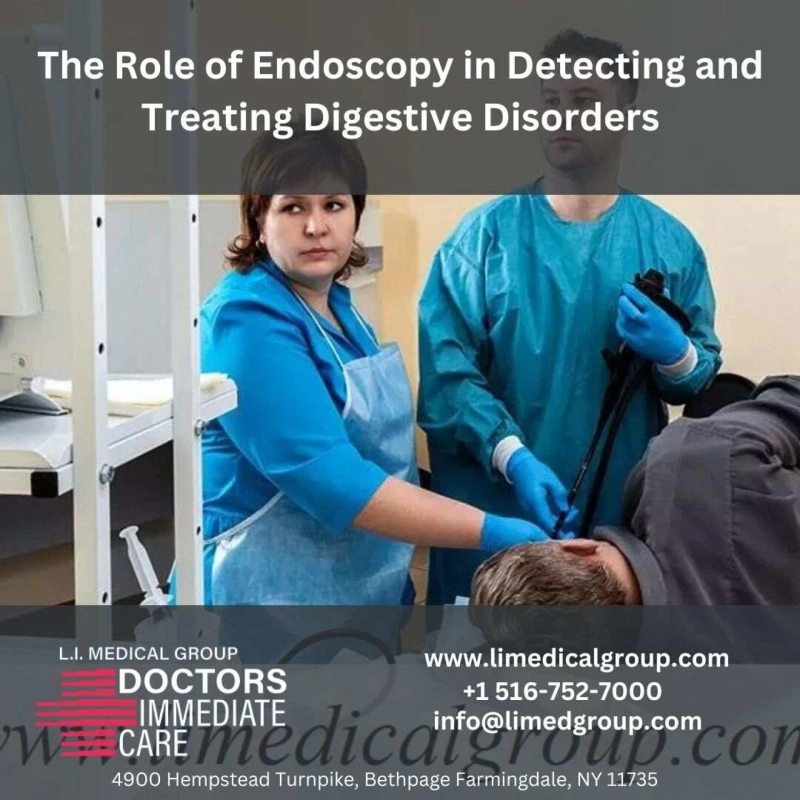Who likes an unhappy or disturbed tummy? No one, right? That’s why it\'s really important to take care of our stomachs and especially our eating habits. But our digestive system is a very complicated system where it breaks down food, absorbs nutrients and eliminates waste products to ensure staying alive. When we travel deep within us, stomach problems can be diagnosed as a source of hidden health risks that may even cause a lot of mental discomfort. Thankfully, modern technology has a powerful tool at its disposal: Endoscopy.
With this technologically advanced procedure, endoscopy specialists in Bethpage Farmingdale can easily look directly into your digestive tract and see what\'s going on inside from a clear perspective. However, endoscopy is more than simply a visual assessment. It is the key instrument for both diagnosing and treating numerous digestive illnesses.
Understanding Endoscopy:
Endoscopy is a minimally invasive method using a flexible tube outfitted with a camera and light supply, known as the endoscope, to inspect the interior parts of the human body. When employed for examination of the digestive system, it is termed gastrointestinal (GI) endoscopy.
The endoscope may be passed via the mouth or anus, depending on which part of the digestive tract is being examined. The physician can get real-time visuals of the esophagus, stomach, small intestine, and colon, as well as other relevant structures during the procedure.
Detection of Digestive Disorders:
Endoscopy is of considerable importance in the early identification and diagnosis of many digestive disorders. A common diagnosis made with endoscopy is gastroesophageal reflux disease (GERD), in which the lower esophageal sphincter does not close properly, resulting in heartburn and stomach acid reflux. Through the observation of the esophagus and the detection of inflammation or acid damage, physicians can make the correct diagnosis of GERD and employ a suitable treatment.
In addition, endoscopy is very useful in terms of detecting peptic ulcers which happen to be open sores that develop on the lining of the stomach or the duodenum. By conducting an endoscopic exam, physicians can look directly at the ulcers, thus pinpointing their location and assessing their impact accurately. This leads to the formulation of individual approaches to therapy, which can include drugs that reduce the acid amounts in the stomach or prescribe antibiotics to get rid of H-pylori infections, which is one of the prevalent causes of peptic ulcers.
Apart from the assessment of non-neoplastic conditions, endoscopy has great importance in the early diagnosis of gastrointestinal cancers. By showing the inner lining of the digestive cavity, doctors will be in a better position to identify suspicious spots or abnormal growths, such as polyps and tumors, that can indicate the presence of cancer. Early detection plays a key role in the search for better results because it provides timely intervention and management measures, such as surgical treatment, chemotherapy, or radiation therapies.
Treatment of Digestive Disorders:
Besides disease diagnosis, endoscopy is also a curative method used for treating digestive diseases of different types. The list of procedures also has endoscopic mucosal resection (EMR) which is focused on the removal of precancerous or abnormal tissue from the lining of the digestive tract. EMR is often utilized in the treatment of first-stage gastrointestinal cancers as well as precancerous lesions, which demand a less invasive method than traditional surgery and, therefore, lowers the chance of various complications.
Another important minimally invasive technique is endoscopic submucosal dissection (ESD). This method permits the resection of a larger lesion or tumors at a one-piece level in the mucosal layer of the gastrointestinal tract. ESD offers better precision and control compared to EMR which makes it more applicable for complex cases in which the patient may be at a high risk using the traditional surgical techniques.
On the other hand, endoscopic treatment has opened new ways for treating gastrointestinal bleeding, which is a severe and even life-threatening situation occurring in the background of various digestive disorders. By applying methods like endoscopic hemostasis, doctors can determine and stop bleeding lesions in the esophagus, stomach, or intestines with cautery, clips, or administration of hemostatic liquid. This approach is not invasive, and the technique not only stops the bleeding but also eliminates the necessity for the procedure, thus enhancing recovery and patient outcomes.
Future Directions and Conclusion:
With the increasing advancement of technology, the use of endoscopy in diagnosing and treating digestive disorders is also likely to increase in scope. This means the existence of more treatment options to achieve improved patient care. New procedures include confocal laser endomicroscopy and endoscopic ultrasound, which could provide enhanced cellular visualization and tissue characterization that may shape targeted therapies and personalized medicine.
To sum up, endoscopy is the core of modern gastroenterology, which gives doctors a very advanced means to correctly diagnose and treat various digestive disorders. There are numerous ways in which this particular diagnostic and therapeutic technique has supported the field of gastrointestinal medicine, such as enabling early cancer detection and minimally invasive therapies that are at the forefront of healing millions of patients globally. With the gut mystery remaining unlocked, endoscopy will, as expected, remain the priority of innovation, leading us toward the desired future where digestive health is effectively managed and diseases are defeated.
The endoscope is not only an entrance into the digestive system but also a ray of hope for many people bothered by various gastrointestinal diseases. In the expert hands of endoscopy specialists in Bethpage Farmingdale, this marvelous technology outlines the road to healing, and that’s why it serves as an essential part of the journey toward a healthy digestive system. No one likes an unhappy tummy!


